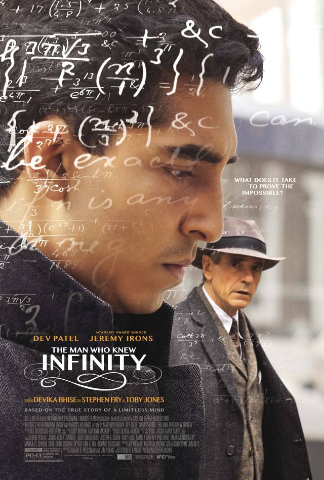The Man Who Knew Infinity
Biopic Stars Jeremy Irons and Dev Patel
By: Jack Lyons - May 27, 2016
In “The Man Who Knew Infinity”, the world of 1914 eerily resonates with thorny issues still plaguing the 21st century; especially when it comes to culture, ethnicity, diversity, and the meritorious acceptance of individuals.
Most Americans don’t really understand or comprehend the English and their “tight little island” mentality. If one wants to irritate an Englishman just call him a European; but be prepared to duck if you happen to be in a pub just before closing.
England is a small county geographically. In 1914, about 60 million souls lived on an island where no one was, and still is, never more than seventy-five miles from the sea. As colonizers, they brought their culture, language, and the English point-of-view to whatever land they came to. In India of 1914, the British Raj had been embedded in power and in the running of the Indian government for almost 150 years.
The intriguing story of “The Man Who Knew Infinity”, insightfully written and deftly directed by Matthew Brown, historically echoes some of the mathematics themes that are present in, not only in the 2015 Oscar-nominated film “The Theory of Everything”, starring Eddie Redmayne who walked away with a Best Actor statuette as astrophysicist Steven Hawking, but also was the subject matter in the earlier film “Good Will Hunting” where Matt Damon nabbed a Best Support Oscar.
Once again, mathematics is the backdrop for this engaging, finely crafted, and nicely acted Anglo/Indian biopic based on the real life experience of Indian mathematics scholar Srinivasa Ramanujan. His field of expertise was in solving the “prime numbers” conundrum, vexing the world’s mathematicians.
The superb Jeremy Irons stars as the brilliant, eccentric, and passionate Cambridge University mathematics professor G. H. Hardy. When Hardy is confronted with the mathematics genius of a young twenty-five year- old completely self-educated Indian student from Madras, named S. Ramanujan (stoically and poignantly played by Dev Patel) Hardy’s faith and passion for his chosen profession is put the test.
Hardy agrees to sponsor and mentor Ramanujan at the behest of an old Indian friend convincing the admissions and faculty at Trinity College, Cambridge that another budding genius should be given an opportunity. After all, one its more famous students, Isaac Newton while sitting under an on-campus apple tree one afternoon discovered ‘gravity’; altering the world of science forever. Who knows where genius comes from? In the case of Ramanujan, Hardy, an avowed atheist asks where he gets his mathematic ideas and formulas from? “I get them from God”, he sincerely replies.
The beauty and simplicity of the film will appeal to viewers who don’t give a fig for analysis of story points and/or whether they need to have a degree in mathematics to appreciate the give and take that Ramanujan endures from his erudite, but boorish and snobbish colleagues concerning his theorems and lack of “proofs” to back up his claims.
This is a feel-good movie that that celebrates the victory of an outsider over the insiders. It is the clashing of the Titans of East-West cultures – India the symbol of eastern thought, and England (at that time the reigning power intellectually as well as militarily) the guardian of western thought. When one contemplates today’s world and its problems, the movie is a welcome and enjoyable respite.
“The Man Who Knew Infinity” is another one of those quintessential British movies in the vein of Merchant/Ivory films whose verisimilitude of the film’s period setting immediately envelops the viewer. If you enjoy rain and glowering scenery in the winter and the eagerly awaited English spring, with its flowers and fleeting sunshine, then you’ll feel right at home. Now you know why actors in early English films never seemed to take off their coats, even while eating. It’s bloody cold! I know, I lived there for three years.
Director Brown scored a major coup when he asked if he could take his camera, cinematographer Larry Smith and the crew along with the cast to Trinity College, Cambridge to film many of the scenes that take place in the movie.
The supporting cast of characters consisting of academics, believers and skeptics are solidly performed by professional actors: Toby Smith (a believer) as Professor Littlewood; Jeremy Northam, as Bertrand Russell (a believer) who tells Hardy to forget protocol and let Ramanujan soar with his theories; Richard Johnson as Vice Master Henry Jackson (a skeptic) and the lovely Devika Bhise as Ramanujan’s loyal young wife Janaka, who remains in Madras while her young husband pursues his academic studies. The film moves slowly at first, allowing the audience to settle in, but picks up speed in the middle section and continues to unfold to its inevitable conclusion. We Yanks are an impatient lot, however there’s no hurry. We should re-learn to slow down and smell the roses along the way. The results are usually worth waiting for.
Reposted courtesy of Jack Lyons and Local Desert News.

